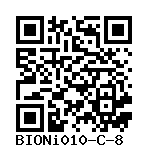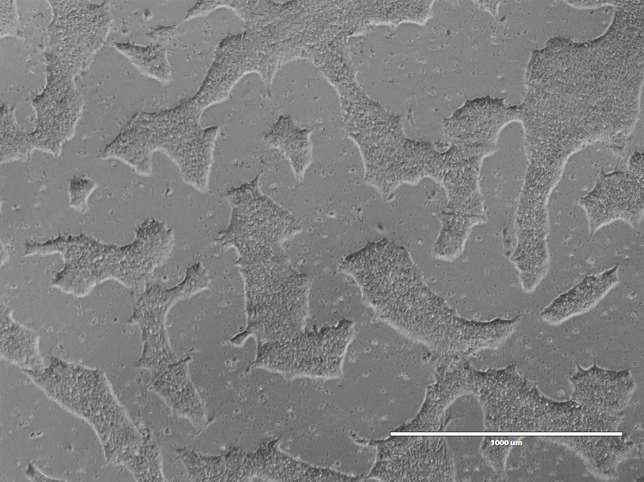BIONi010-C Trem2 T66M, #Y5-80
BIONi010-C-8
General
Cell Line |
|
| hPSCreg name | BIONi010-C-8 |
| Cite as: | BIONi010-C-8 (RRID:CVCL_LE09) |
| Alternative name(s) |
BIONi010-C Trem2 T66M, #Y5-80
|
| Cell line type | Human induced pluripotent stem cell (hiPSC) |
| Similar lines |
BIONi010-C-25 (BIONi010-C heterozygous TREM2 KO) BIONi010-C-7 (BIONi010-C Trem2 R47H) BIONi010-C-17 (BIONi010-C TREM2 KO) BIONi010-C (BIONi010-C, K3P53) BIONi010-C-2 (BIONi010-C ApoE E3/E3 #H8 P32) BIONi010-C-3 (BIONi010-C ApoE KO #KO30 P30) BIONi010-C-70 (BIONi010-C with an APOE 2/2 genotype with an additional, homozygous christchurch mutation) BIONi010-C-71 (BIONi010-C with an APOE 3/3 genotype with an additional, homozygous christchurch mutation) BIONi010-C-4 (BIONi010-C ApoE E4/E4 #B44 P27) BIONi010-C-5 (BIONi010-C CD33 E2del #N14 P26) BIONi010-C-6 (BIONi010-C ApoE E2/E2) BIONi010-C-9 (BIONi010-C CD33 KO) BIONi010-C-56 (BIONi010-C-A713T-C25) BIONi010-C-57 (BIONi010-C-A713T-C42) BIONi010-C-58 (BIONi010-C-A713T-C1) BIONi010-C-59 (BIONi010-C-A713T-C33) BIONi010-C-60 (BIONi010-C-R589C-C7) BIONi010-C-61 (BIONi010-C-R589C-C16) BIONi010-C-62 (BIONi010-C-R589C-C5) BIONi010-C-63 (BIONi010-C-R589C-C9) BIONi010-C-18 (BIONi010-C TBK1 KO) BIONi010-C-19 (BIONi010-C IKBKE KO) BIONi010-C-43 (BIONi010-C + aSNCA-wt AAVS1) BIONi010-C-44 (BIONi010-C + aSNCA-A53T AAVS1) BIONi010-C-10 (HNF1AP291fsinsC +/- 54-5) BIONi010-C-11 (HNF1AP291fsinsC -/- 66-1) BIONi010-C-12 (HNF4ApR309C -/- 2-4) BIONi010-C-52 (BIONi010-C with an APOE 2/2 genotype (with two functional alleles in contrast to BIONi010-C-6)) BIONi010-C-53 (BIONi010-C with an APOE 3/3 genotype (with two functional alleles in contrast to BIONi010-C-2)) BIONi010-C-54 (BIONi010-C with an APOE 4/4 genotype (with two functional alleles in contrast to BIONi010-C-4)) BIONi010-C-48 (BIONi010-C hMDR1) BIONi010-C-45 (BIONi010-C iCRE AAVS1 GBA1 LoxP EX5-6) BIONi010-C-64 (BIONi010-C-T2A-Nanoluciferase reporter cl. 29) BIONi010-C-51 (BIONi010-C TNNI3-mCherry reporter) BIONi010-C-13 (BIONi010-C + NGN2 #I7-26) BIONi010-C-15 (BIONi010-C +dox inducible NGN2-GFP) BIONi010-C-55 (BIONi010-C TNNI3-mCherry/TNNI1-EGFP dual reporter cl. 74) BIONi010-C-41 (BIONi010-C + iNGN2 Two-plasmid system/CRISPR-2) BIONi010-C-42 (BIONi010-C + iCRE AAVS1) BIONi010-C-49 (BIONi010-C + synapsin-m2rtTA + SNCA-wt) BIONi010-C-50 (BIONi010-C + synapsin-m2rtTA + SNCA-A53T) BIONi010-C-24 (BIONi010-C Dox a-syn) BIONi010-C-65 (BiONI010-C-O16) BIONi010-C-66 (BIONi010-C-N7) BIONi010-A (K1P53) BIONi010-B (K2P53, BIONi010-B) |
| Last update | 7th March 2023 |
| Notes | No larger chromosomal aberrations to be reported. Chr22: 1,4Mbp duplication in q11.23 |
| User feedback | |
Provider |
|
| Generator |
Bioneer (BION)
Contact:
Bioneer (BSC) |
| Owner | Bioneer (BSC) |
| Distributors | |
External Databases |
|
| BioSamples | SAMEA4454011 |
| Cellosaurus | CVCL_LE09 |
| Wikidata | Q54796782 |
General Information |
|
| Projects | |
| * Is the cell line readily obtainable for third parties? |
Yes Research use: allowed
Clinical use: not allowed
Commercial use: not allowed
|
| Subclone of | |
Donor Information
General Donor Information |
|
| Sex | male |
| Ethnicity | Black or African-American |
Phenotype and Disease related information (Donor) |
|
| Diseases | No disease was diagnosed.
|
| Disease associated phenotypes | no phenotypes |
Karyotyping (Donor) |
|
| Has the donor karyotype been analysed? |
Yes
46, XY
Karyotyping method:
G-Banding
|
Other Genotyping (Donor) |
|
| Is there genome-wide genotyping or functional data available? |
No
|
Donor Relations |
|
| Other cell lines of this donor | |
External Databases (Donor) |
|
| BioSamples | SAMEA3105780 |
Ethics
Also have a look at the ethics information for the parental line
BIONi010-C
.
| For generation of the cell line, who was the supplier of any recombined DNA vectors or commercial kits used? |
hIPSC Derivation
General |
|
|
The source cell information can be found in the parental cell line
BIONi010-C.
|
|
Reprogramming method |
|
| Vector type | Non-integrating |
| Vector | Episomal |
| Genes | |
| Is reprogramming vector detectable? |
No |
| Methods used |
PCR
|
Vector free reprogramming |
|
Other |
|
| Derived under xeno-free conditions |
No |
| Derived under GMP? |
No |
| Available as clinical grade? |
No |
Culture Conditions
| Surface coating | Matrigel/Geltrex |
| Feeder cells |
No |
| Passage method |
Enzyme-free cell dissociation
EDTA
|
| O2 Concentration | 18 % |
| CO2 Concentration | 5 % |
| Medium |
Essential 8™
|
| Has Rock inhibitor (Y27632) been used at passage previously with this cell line? | Yes |
| Has Rock inhibitor (Y27632) been used at cryo previously with this cell line? | No |
| Has Rock inhibitor (Y27632) been used at thaw previously with this cell line? | No |
Characterisation
Differentiation Potency
Microbiology / Virus Screening |
|
| HIV 1 | Negative |
| HIV 2 | Negative |
| Hepatitis B | Negative |
| Hepatitis C | Negative |
| Mycoplasma | Negative |
Certificate of Analysis |
|
| Is there a certificate of analysis available? |
Yes
Passage:
26
|
Genotyping
Karyotyping (Cell Line) |
|
| Has the cell line karyotype been analysed? |
Yes
|
Other Genotyping (Cell Line) |
|
| Is there genome-wide genotyping or functional data available? |
Yes
Whole genome sequencing
https://ega-archive.org/studies/EGAS00001002755 This cell line has undergone WGS using the Illumina HiSeq X platform at 30x coverage. Fastq files are stored at the European Genome Archive, users can apply for access to this data by submitting an application form to the EBiSC Data Access Committee https://ega-archive.org/dacs/EGAC00001000768 |
Genetic Modification
| Disease/phenotype related modifications |
|



Login to share your feedback, experiences or results with the research community.